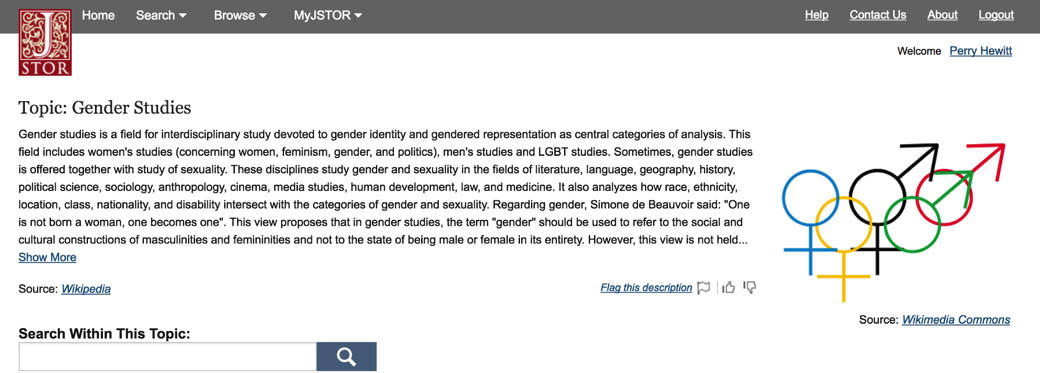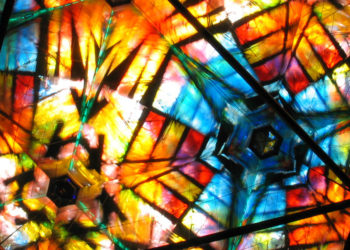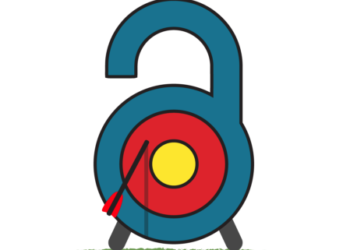Editor’s Note: Perry Hewitt works at the intersection of publishing, marketing, and digital strategy. She currently leads marketing for ITHAKA, a not-for-profit working to advance and preserve knowledge and to improve teaching and learning through innovative use of digital. Perry advises students, startups, nonprofits, and cultural institutions; she also writes and speaks on topics including digital transformation, user experience, women and leadership, and the social web.
Last November, Oxford Dictionaries named “post-truth” 2016’s international word of the year, based in part on a 2,000% year-over-year increase in the word’s usage. Many are wary of consuming information online in a digital environment rife with fake news and clickbait headlines. Scholarly publishers and librarians have a responsibility to help readers overcome their fears, delivering high-quality, reliable content and going the extra mile to make truth widely accessible.
At JSTOR, a not-for-profit digital library of humanities and social science content created in partnership with thousands of publishers and libraries, we are working through our main platform and our JSTOR Daily magazine to bring peer-reviewed academic content to the mainstream. Three of our initiatives relate to Wikipedia – the 6th most used site on the internet, per Alexa. These include: our editors’ access program, new JSTOR topic pages, and support for campaigns like #1Lib1Ref – all of which aim to expand access to peer-reviewed research globally. I want to share our approach, so that publishers and libraries might adopt or be inspired by how these initiatives can be useful in the mission to increase reach of scholarly content and to combat “post-truth” assertions.

Wikipedia Editor’s Program
For five years, JSTOR has run a program providing free access to the archives of thousands of humanities and social science journals to active Wikipedia editors, the volunteers who write and edit the Wikipedia articles we all read. We do this to inform Wikipedia articles with peer-reviewed research; as the xkcd comic above reminds us, there are a lot of citations needed. This year, 500 editors have access, and JSTOR citations are found on articles about everything from Aeschylus to Scilloideae. Since Wikipedia metrics tracking began in 2014, we’ve seen over 29,000 references from journals on JSTOR added to Wikipedia articles. Additionally, through the Register & Read no-cost access program, many of these articles are available for anyone to read online for free. In 2016 alone, 1.4 million people took advantage of this reading program from links across the web, including Wikipedia.
It’s through these and many other activities that we can have an impact in the world. I encourage academic content providers – publishers and libraries – to look for and share ways to play a larger role.
Topic Pages

In December 2016 JSTOR launched topic pages on the platform to provide background and context for the broad range of subjects covered. The topics are a subset of a 45,000-term thesaurus, built from 17+ source vocabularies and recently integrated with the platform. Using the topics, we query against the DBPedia knowledge base to match the thesaurus terms with Wikipedia entries, and pull them into the topic pages. In the three weeks post launch, there have been nearly 60,000 views of JSTOR pages with snippets pulled from Wikipedia. It’s still early days — sometimes the snippets are incomplete, so we’ve added a mechanism for user feedback and are eager to hear user response to this feature.
Wikipedia’s #1lib1ref Program
Finally, Wikipedia and JSTOR have a shared mission around greater access to information — and a strong partnership with the library community. Wikipedia’s #1Lib1Ref program is currently underway through February 3, encouraging librarians to contribute references to Wikipedia. We’re participating by putting a call to action on the JSTOR platform home page, amplifying the message through social media, and participating in local events.
It’s through these and many other activities that we can have an impact in the world. I encourage academic content providers – publishers and libraries – to look for and share ways to play a larger role. Here are five ways you can support high quality scholarly content informing public discourse:
- Write yourself. Our community is well-positioned to contribute authoritative voices and make connections between current events and academic research.
- Become a Wikipedia editor, as the platform tries to attract more diverse contributors. Also, mind the gap: develop content in topic areas underrepresented in Wikipedia. One of the events we’ll be participating in during #1Lib1Ref is the New York Botanical Garden edit-a-thon focused on improving entries related to women in science.
- Where possible, content providers should seek rights holder consent to donate access to editors of the Wikipedia Library. Help the editors by providing access to the best secondary sources for academic research.
- Content providers can consider offering individual access services, like Register & Read, to provide ways for unaffiliated Wikipedia users to view content. Beyond the benefit to readers, individual access programs can help content providers understand more about usage patterns to inform content collections.
- Build pathways connecting reputable resources. I’ve worked in digital long enough to remember resistance to external links on public websites — it was hard for nonprofits and corporations alike to relinquish that control. Smart linking between carefully curated collections and broader user generated content sites will make quality platforms stronger by creating healthy ecosystems rather than walled gardens.
From content producers and platforms to librarians worldwide, there are many in this community committed to creating and disseminating peer-reviewed scholarship to inform our post-truth world. Let’s make every effort to share these best practices for interaction through campaigns like #1Lib1Ref, and more broadly.
Discussion
18 Thoughts on "Guest Post: Perry Hewitt — Bringing the Cathedral to the Bazaar: Academic Content and Wikipedia"
I have used JSTOR for many years and it is invaluable. But I am uncertain about this Wikipedia connection. I wrote the biography of a scientist and believe I am the best informed person on the planet in this respect. When I added a brief note to a Wikipedia article on him, it was removed within a day by one of the Wikipedia vigilantes. In this post-truth era we should all be highly sceptical of anything Wikipedia offers. Could Perry Hewitt clarify.
Thanks for your thoughtful comment. We are at an interesting inflection point where we’re struggling to define the right ways for curated, peer-reviewed academic content to intersect with publicly-created knowledge bases. We know that people are consulting both, so what kind of interaction makes the most sense?
Re: your experience. I know Wikipedia has struggled to make its posting process accessible to a wider range of contributors — and the policies on why things get removed are sometimes unclear (and frustrating!). I hope that with initiatives like #1Lib1Ref, Wikipedia will attract a broader base of editors, which will have the effect of clarifying policies and simplifying posting for infrequent contributors.
Well enough, but remember there are scientific bubbles as well as political.
There are many reasons, good and bad, why material added to Wikipedia may be removed by another contributor. One of the most common is failing to provide a citation to a reasonably credible published source: this is one of Wikipedia’s founding principles. Did you cite the biography you published when you made your contribution? I hope you persevere with Wikipedia; and please remember there are many ways forward if you don’t like what another contributor has done. Starting a discussion on the article’s help page is often the first step. You can also ask for an experienced editor to step in and adjudicate.
I recall all entries and corrections thereof are archived in Wikipedia backfiles, so for someone who wishes to research it, the information you seek is available. However ideal it may seem in principle, the ultimate test of any system, be it in political or scientific domains, is the ease with which it can be subverted. My Wikipedia example is not a lone one. There are folks out there whose agendas do not match yours or mine. Caveat lector!
I, too, am interested in comments from Perry and others. As we all know, there are pitched battles in the Cathedral, itself, between scholars not just in the humanities, but also in the STEM/STM areas regarding theory and interpretation. Some are on “facts” as “facts”. Some, as Kahneman has noted are due to “theory-induced” blindness that often stand for long periods. Some have lead to founding of alternative scholarly journals and split departments and even institutions.
Interestingly, some of that knowledge creation is produced by parties outside of the Cathedral and, today, does not seek to be vetted by the residents of the Cathedral. With the rise of Watson and off-spring, it is sometimes difficult to assign provenance.
JSTOR’s contribution and efforts are commendable, important and even critical. The fact that Wiki is now curated points out the role of review and resolution as the wild west of its origins has matured.
Thanks for your comment — I believe there’s a role for the cathedral and the bazaar, but there has to be a meaningful cross-pollination.
Omar Khayyam wrote, The moving finger writes;…. And so it is with what is published in the journals of the Cathedral. Wiki changes the game as the original comment notes. JSTOR’s selection makes it a de facto editor of Wiki. Over time, how does JSTOR plan to respond to the volatility of virtual “ink” either by continuing to add to the oeuvre it has contributed or to adjudicate the differences that may arise and which may contribute to the potential half life of its contribution
Thank you, Perry, for sharing these experiences and insights! I’m a big fan of the Wikipedia Library program and it warms my heart to see publishers and scholarly societies encouraging their authors and members to contribute to the quality of the knowledge found there. Information professionals have an obligation to counter flare-ups of misinformation and misunderstanding out there on the web, with evidence-based, peer-reviewed resources to educate the public. Kudos to you and JSTOR!
Thanks — would also like to see more women editing Wikipedia, and hope #1Lib1Ref helps with that!
Can someone explain how this is a good thing? I am not seeing it, at least not based on the original post.
Hello all,
Perhaps I am missing something here, but the call is to people who might be knowledgeable in a topic to add to Wikipedia, and for publishers to allow those Wikipedia contributors access to toll access articles to help them with their contribution. But what about the reader? They won’t be able to go to the primary source because it will be behind a toll for them.
Or is the suggestion that if something is referenced in Wikipedia that the publisher considers making that article available to the Wikipedia reader? That’s a new take on open access.
Danny
It’s primarily the former — a case to make the public knowledgebase the best it can be with reliable citations by providing access to a number of editors. Some of these cited links could be available to the reader through an access program like register & read (or similar programs at other aggregators). Thanks for your comment.
What I’m not getting is how having Wikipedia articles show up in Jstor search results benefits anyone. Libraries subscribe(ed) to Jstor because it is (was)100% credible, vetted sources. Wikipedia is exactly the opposite of that there is no certainty, even if the editors have access to Jstor. When Wikipedia articles show up in Jstor searches it seriously damages not only the Jstor brand, but the reputation of the customer library.
We subscribe to Jstor so that we have reliable electronic access to vetted, and peer-reviewed scholarly sources. It is literally electronic storage (a repository) that replaces the paper versions which were occupying our shelves unused. We did not subscribe to promote Wikipedia, especially in our search results.
Providing established wikipedia editors access to Jstor content is a good thing. Putting wiki entries in Jstor search results is entirely something else.
Could not agree more with Dave Wiseman. Perry, please tell us where we are wrong.
Good morning! Perhaps I should have been clearer — Wikipedia articles do not show up as search results alongside peer-reviewed research (which remain 100% credible and vetted). They appear on new topic pages, which are meant to drive browsing by serving up related topic areas. My angle on this was that it’s a solid cross-pollination, where each service is doing what it’s good at: Wikipedia covers a lot of topics and is created by the public, the peer-reviewed research is created by academics, and vetted by the team here. Again, only peer-reviewed research shows up in the list of results.
It’s also a beta feature, meaning we are collecting comments from our users about who likes it, who dislikes it, and why — a more iterative way to bring improvements to the platform. Hope that is clarifying.
I have seen the links. They look like subject headings and they link out to Wikipedia. What you are doing is giving Jstor-level weight (which is substantial, and has a well-earned reputation for quality) to an source known primarily for its unreliability. Jstor is a respected brand, a Rolls-Royce. Wikipedia is a Yugo. This process slaps a Jstor insignia on a Yugo. It is a bad move. Our faculty are going to freak out. I predict that once it is known that this experiment ever took place, regardless of whether or not it is continued our Jstor statistics will decline.
It is a bad idea and should be scrapped yesterday.



